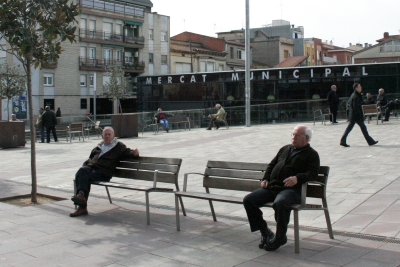Quality of Life and Needs of the Terminal Patient: an Applied Study to Improve Precarious Social Environments
Project location: Spain, Barcelona
Project start date: July 2008 -
Project end date: December 2009
Project number: 2008-05
Beneficiary: Universidad Autónoma de Barcelona
Timeline of the present activity report: From 1.10.2008 to 12.12.2009

Life expectancy has been growing in the last century in Europe in a spectacular way, but the increase in number of old people means an increase of specific needs in social and sanitary attention. The term "final phase of life" refers to the period of life of those people who are arriving at the end of their life, due to illness or advanced age. The progress in life expectancy not means necessary to behave adequate quality of life. In this situation, people ´s needs can change, they have different worries, levels of dependence, fears or particular emotions in such a way that welfare professionals must understand and take into consideration, specially in front of the new socio-demographic reality, including the integration of different cultural backgrounds and precarious social environments.
Health care sistems are manly oriented to diagnosis and treatment of pshysical aspects of the andvanced disease like pain and symptoms, but the social, psychological and spiritual needs are often poorly covered. And even more excepcional is attention to the needs of the family, marginal groups and intercultural situations. It is necessary to get more information about the patients needs in the different stage of adaptation to the terminal situation and develop a system that from more humanitarian point of view facilitates the relation of the society, mainly by voluntary action, with the eldery and the patients in the final phase of the life.
UAB has developed a situational analysis system that integrates objetive data (sanitary services avaliable in a population) with subjetive aspects (point of view of professionals, patients, families...) The subjective information (attitudes, opinions, needs), has been obtained interviewing people of different ages, cultural background and professions (many sanitary professions).
The qualitative and quantitative instrumens applied are:
- Questionnaire of negative stereotypes toward old age (CENVE)
- Census data questionnaire
- Questionnaire about the knowledge of any available elderly care service in Ripollet
- Questionnaire about attitudes and opinions about the stages of old age, , final phase of life, terminal situation and death
- Open interviews
The socio-sanitary centers included are:
- two primary health care centers (CAP I and CAP II) - that provides the PADES program (domiciliary attention)-
- the hospital ‘Parc Tauli' (located in Sabadell), with many heath services, inclouding the palliative care unit
- private health assistance centers: "Les Moreres" and "Ripollet")
- day care center for the eldery and handicaped people ("Can Vargas")
- residence attention service (SAD, carried out by private enterprises)
- Social resurces provide by the town council of Ripollet
- Social center for eldery
- Non Governmental Organizations (Red Cross, Caritas, "A new horizon").
- Pharmacies
UAB has organized different meetings in order to find the strategy best suited to each evaluable situation. Following strategies were developed to access different groups of the target population:
1. At the health care level, UAB contacted the coordinators of all medical facilities (public and private). In the case of patients and families, UAB collected their opinion while they were in the waiting rooms. Regarding health professionals, questionnaires were largely self-administrated. UAB conducted also interviews with professionals of all pharmacies in the area, thus recording the attitude of this other health collective. UAB also contacted specific centres for the elderly or people at the end of their life.
2. At the social level, UAB contacted all the agencies involved, the City Social services and all the NGOs and associations in the Ripollet area (Red Cross, Caritas, "A new horizon...). After several meetings with the people involved, UAB delivered questionnaires to professionals and volunteers working in those services, and people who made use of services.
3. To get information about the views of young people on these issues, UAB contacted all secondary schools (Ripollet has 3), and UAB held meetings with the respective directors and coordinators to explain the objective of the project. Also, the sample of young population was complemented by students up to the age of 20, of the University of the Municipality (Autonomus University of Barcelona -UAB-), particularly the first courses in the faculties of Psychology and Medicine.
4. In order to record the attitudes of people of different cultures living in Ripollet, UAB made contact with cultural centres and associations formed by immigrants from different countries, offering the possible collaboration and administration of questionnaires and opinion scales.
5. Finally, to obtain data from the general population, several interviews were conducted in open public environments, where typically large numbers of peoples are concentrated, such as markets, parks, etc.
Up the date of this report 427 subjects has been interviewed, with ages varying from 15 to 89 years old, including among them the general population, immigrants, professionals in health and relatives who accompany or have accompanied at some point in their life a person close to the final stage of life.
From the results obtained, UAB highlight the following points:
1. Regarding stereotypes about old age, UAB has observed a vast difference between questionnaire responses and the open questions. In the first one, the groups have a positive attitude toward ageing and the different aspects of it, while in the open questions UAB detected more negative attitudes.
2. UAB has found that there is a match between the perception of being together as a very important need in old age, and the perception of loneliness as a main concern for elderly people.
3. UAB has noted that one of the most important aspects to improve the quality of life of elderly people is a positive change of attitude toward them.
4. The final phase of life is mainly associated with death and the proximity of it, but not with quality of life.
5. While the perception of needs and concerns in the final phase of life is similar across different age groups, it seems that the importance assigned to this areas increases as people get older.
6. In opinion of the respondents (patients, professionals, family), "one's own home" is the most appropriate place to die.
7. However, we note that among the aspects proposed for improving the quality of life of terminally ill people are the creation of specific centres, rather than the development of home care.
8. Psychological support is indicated as one of the important aspects to provide as well, aimed at both the elderly, as well as at people in the terminal phase. In this respect young people, relatives and health professionals agree.
9. Among the specific proposals for improvements suggested by the professionals, UAB emphasize the increase in material resources and specific continuous training.
10. UAB noted that available care services at the end of life for the people of Ripollet are almost unknown.
11. When asked about aspects relating to the end of life, a reluctant attitude to think about it is observed, which could possibly reflect some anxiety toward the topic.
The analysis carried out at various levels in the Ripollet population, about old age and the final phase of life show that, despite the multitude of services and support system available, there are some major shortcomings. The data obtained so far indicates the need to incorporate some form of psycho-educational support to medical and social level with which to train attitudes towards old age and the final phase of life, and to ensure better support for elderly people, terminally ill people and their family.
In the last part of this project (from January to July 2010), UAB has the following goals:
- To complete the data collected, including more males and more foreign and /or marginal people.
- To develop a new social support service, oriented to promote many integrated actions against isolation and to maintain the quality of life from age to the final phase of life.
This Project has been presented/discussed in the following contexts:
- 15º Congress of the French Society of Palliative Care (Congrès de la Société Française de Accompagnement et des Soins Palliatifs , 18th - 20th of June 2009).
- Course: "Helping in the Dying Process". (Grìfols Foundation, 9th -10th of November 2009).
- III Spanish Meeting of Nursing in Palliative Care (5th -6th of November 2009)
- "Alba Payás" Course. Therapeutic intervention from an integrative model in lost processes. (12th-13th of November, 2009).
- I Meeting of the Aragon Society of Palliative Care (13th-14th of November 2009).
- I Meeting "The Art of being together in living and dying". (I Jornada L'art del bon acompanyar: en la vida i en la mort. "Sant Jaume" and "Santa Magdalena" Hospital Fundation. 25 november 2009).
- Conference-Course about Death and Grief from a Psychosocial Perspective (Colegio Oficial de Psicólogos de Cataluña, September-December , 2009).




